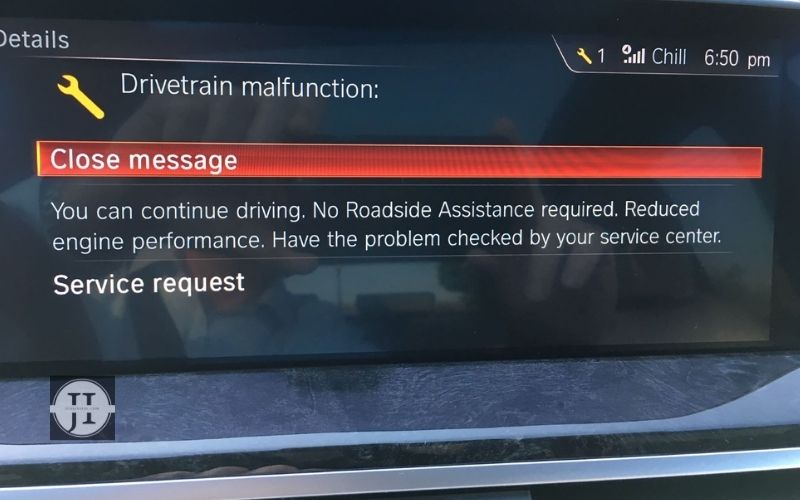The drivetrain is a crucial component of any vehicle, including BMWs. However, sometimes even the most reliable drivetrains can experience malfunctions. In this blog post, we will delve into the world of BMW drivetrain malfunction errors. We will explore what exactly a drivetrain malfunction error is, the symptoms that may indicate its presence, and the common causes behind these errors. Additionally, we will discuss how to diagnose a drivetrain malfunction error and the common repairs that may be needed to rectify the issue. Furthermore, we will provide valuable tips on preventing such errors and shed light on the potential cost of fixing a BMW drivetrain malfunction error. Stay tuned for a comprehensive guide that will help you understand and tackle this common automotive issue.
What Is A Bmw Drivetrain Malfunction Error?
A BMW drivetrain malfunction error is a fault that occurs in the drivetrain system of a BMW vehicle. The drivetrain is an essential component of a car, as it is responsible for transferring power from the engine to the wheels. When a drivetrain malfunction error occurs, it indicates that there is a problem within this system, which can affect the overall performance and safety of the vehicle.
The drivetrain of a BMW consists of several interconnected parts, including the engine, transmission, driveshaft, axles, and differential. These components work together to deliver power to the wheels and allow the vehicle to move. However, if any of these parts or their associated sensors and controls fail or malfunction, it can trigger a drivetrain error message on the car’s dashboard.
A drivetrain malfunction error can manifest itself through various symptoms. Some of the common signs include strange noises coming from the drivetrain, such as clunking or whining sounds. The vehicle may also experience a loss of power or have difficulty accelerating. Additionally, a drivetrain malfunction error can cause the car to shake or vibrate while driving.
There are several factors that can contribute to a BMW drivetrain malfunction error. One of the main causes is a mechanical or electrical issue within the drivetrain components. For example, a faulty transmission sensor or a worn-out driveshaft can trigger the error message. Another possible cause is the failure of the drivetrain control module, which is responsible for managing and coordinating the different drivetrain components.
Diagnosing a drivetrain malfunction error can be a complex process and may require specialized diagnostic tools. It is recommended to take the vehicle to a certified BMW technician who can connect the car to a diagnostic scanner to retrieve error codes. These codes provide information about the specific component or system that is causing the malfunction, allowing for a targeted repair.
Symptoms Of A Drivetrain Malfunction Error
A drivetrain malfunction error in a BMW is a serious issue that can cause significant disruption to the performance and functionality of the vehicle. It is important for BMW owners to be aware of the symptoms of a drivetrain malfunction error in order to address the problem promptly and prevent further damage to the drivetrain system.
One of the most common symptoms of a drivetrain malfunction error is an illuminated warning light on the dashboard. In BMW vehicles, this warning light is often represented by an exclamation mark inside a yellow triangle. This light indicates that there is a fault or malfunction in the drivetrain system, and it is crucial to address it as soon as possible.
Another symptom of a drivetrain malfunction error is a loss of power or difficulty in shifting gears. This can manifest as sluggish acceleration, hesitation when changing gears, or the vehicle getting stuck in a particular gear. These issues can significantly impact the driving experience and should be investigated promptly.
A peculiar noise or vibration coming from the drivetrain system can also be a symptom of a malfunction. This can be a result of various issues such as worn-out bearings, damaged gears, or faulty shafts. It is important not to ignore any unusual noises or vibrations and seek professional assistance to diagnose and resolve the problem.
Furthermore, a drivetrain malfunction error can sometimes be accompanied by a burning smell or the presence of fluid leaks. These signs indicate that there may be a more severe issue in the drivetrain system, such as a leaking transmission or differential fluid. It is crucial to address these leaks promptly to prevent further damage and costly repairs.
If you notice any of these symptoms in your BMW, it is essential to take immediate action. Ignoring a drivetrain malfunction error can lead to further damage to the drivetrain system and potentially result in costly repairs. Therefore, it is recommended to consult a qualified BMW technician who can diagnose and resolve the issue effectively.
Regular maintenance and routine inspections can help prevent drivetrain malfunction errors from occurring. By adhering to BMW’s recommended maintenance schedule and ensuring that all fluids and components are in optimal condition, you can minimize the risk of encountering drivetrain issues. Moreover, practicing safe driving habits and avoiding aggressive maneuvers can also contribute to the longevity of the drivetrain system.
In conclusion, being aware of the symptoms of a drivetrain malfunction error in a BMW is crucial for timely detection and resolution of the issue. Any unusual warning lights, loss of power, strange noises, or fluid leaks should not be disregarded. Seeking professional assistance and addressing these symptoms promptly can prevent further damage and ensure the smooth and safe operation of your BMW.
Causes Of A Bmw Drivetrain Malfunction Error
When it comes to owning a BMW, one of the potential issues that can arise is a drivetrain malfunction error. This error message can be alarming for BMW owners, as it indicates that there is a problem with the drivetrain system of the vehicle. Understanding the causes of a BMW drivetrain malfunction error can help owners to better diagnose and address the issue.
One of the main causes of a drivetrain malfunction error in a BMW is a faulty sensor. The drivetrain system relies on sensors to gather information and send it to the control module. If one of these sensors malfunctions or fails, it can trigger the error message. For example, a faulty wheel speed sensor can cause the system to incorrectly detect a wheel slipping or spinning, leading to the drivetrain malfunction error.
Another common cause of a BMW drivetrain malfunction error is a problem with the transmission. The transmission plays a crucial role in the drivetrain system, as it is responsible for transferring power from the engine to the wheels. If there is an issue with the transmission, such as worn-out gears or a damaged clutch, it can result in a drivetrain malfunction error. Regular maintenance and servicing of the transmission can help to prevent such issues from occurring.
How To Diagnose A Drivetrain Malfunction Error
Drivetrain malfunctions in BMW vehicles can be frustrating and potentially costly issues to deal with. When a drivetrain malfunction error occurs, it is important to diagnose the problem accurately in order to find the appropriate solution. In this blog post, we will explore the steps to diagnose a drivetrain malfunction error in your BMW and provide some helpful tips to resolve the issue.
1. Check for Warning Lights: The first step in diagnosing a drivetrain malfunction error is to check for any warning lights on the dashboard. BMW vehicles are equipped with advanced onboard diagnostic systems that can often identify the specific cause of the error. Look for any error codes or messages related to the drivetrain malfunction. This information can be incredibly useful in pinpointing the exact issue.
2. Perform a Visual Inspection: Once you have checked for warning lights, it is time to perform a visual inspection of the drivetrain components. Look for any signs of damage, leaks, or loose connections. Pay close attention to the transmission, driveshaft, differentials, and axles. Any physical abnormalities could be indicative of a drivetrain malfunction.
3. Use Diagnostic Tools: In addition to the onboard diagnostic system, there are various diagnostic tools available that can help diagnose drivetrain malfunctions in BMW vehicles. These tools can provide more detailed information about specific parts and systems, helping you identify the root cause of the problem. It is recommended to consult a professional mechanic or technician who has access to these diagnostic tools.
4. Check Fluid Levels: Low or contaminated fluid levels can also contribute to drivetrain malfunctions. Make sure to check the levels of transmission fluid, differential fluid, and transfer case fluid. If any of these fluids are low or appear dirty, it is important to replenish or replace them as necessary.
By following these steps and considering the possible causes and solutions listed above, you can effectively diagnose a drivetrain malfunction error in your BMW. However, it is important to note that some issues may require professional expertise to accurately diagnose and repair. If you are unsure or unable to resolve the problem on your own, it is always recommended to consult a qualified mechanic or BMW specialist.
Common Repairs For Drivetrain Malfunction Errors
The drive train is a critical component of any vehicle, including BMWs. It is responsible for transferring power from the engine to the wheels, allowing the vehicle to move. However, like any other mechanical system, the drive train can develop faults over time, leading to drivetrain malfunction errors. In this blog post, we will explore the common repairs that are often required to fix drivetrain malfunction errors in BMWs.
One of the most common repairs for drivetrain malfunction errors is the replacement of a faulty sensor. Sensors play a crucial role in monitoring various aspects of the drivetrain, such as engine speed, wheel speed, and transmission fluid temperature. If a sensor malfunctions or provides inaccurate readings, it can trigger a drivetrain malfunction error. In such cases, the faulty sensor needs to be identified and replaced to resolve the issue.
| Possible Causes | Probable Solutions |
|---|---|
| Worn or damaged drivetrain components | Replace the faulty parts |
| Electrical or computer system malfunction | Perform a system reset or have the computer system repaired |
| Contaminated or low fluid levels | Refill or replace the fluid |
| Improper shifting or clutch engagement | Practice proper driving techniques or consider clutch adjustment |
In some cases, the drivetrain malfunction error may be caused by a malfunctioning solenoid or valve in the transmission system. These components are responsible for regulating the flow of transmission fluid and controlling gear shifts. A faulty solenoid or valve can result in improper gear shifts or a loss of power. Repairing or replacing the affected solenoid or valve can help resolve the drivetrain malfunction error and restore normal operation.
Note: It is important to have the repairs carried out by a qualified technician or at an authorized BMW service center. BMW vehicles require specialized knowledge and tools for accurate diagnosis and repair of drivetrain malfunction errors. Attempting to repair the drivetrain on your own or using unauthorized mechanics can result in further damage and costly repairs.
Another common repair for drivetrain malfunction errors is the replacement or repair of damaged wiring or connectors. Over time, the wiring in the drivetrain system can become worn out or damaged, leading to connectivity issues and malfunction errors. Inspecting the wiring harness and connectors for any signs of damage and replacing or repairing them can help resolve the issue.
In some cases, the drivetrain malfunction error may be caused by a mechanical issue within the drivetrain itself, such as a worn-out clutch or a damaged driveshaft. These components undergo extensive wear and tear, especially in high-performance vehicles like BMWs. Replacing or repairing the damaged drivetrain components can help eliminate the malfunction errors and restore the vehicle’s performance.
Regular maintenance and servicing of the drivetrain can also help prevent drivetrain malfunction errors. This includes periodic inspections, fluid changes, and following the manufacturer’s recommended service intervals. By maintaining the drivetrain in optimal condition, you can reduce the risk of malfunction errors and prolong the lifespan of the components.
Preventing Drivetrain Malfunction Errors
A drivetrain malfunction error in a BMW can be a frustrating and potentially dangerous issue. It can cause a variety of symptoms and may result in costly repairs. However, there are steps you can take to prevent drivetrain malfunction errors from occurring in the first place. By properly maintaining your vehicle and being aware of potential causes and warning signs, you can decrease your chances of experiencing this frustrating issue.
One important step in preventing drivetrain malfunction errors is to regularly inspect and maintain your BMW. This includes following the manufacturer’s recommended maintenance schedule, which typically includes regular oil changes, filter replacements, and inspections of the drivetrain components.
Additionally, it is essential to pay attention to any warning signs that may indicate a potential drivetrain malfunction. These can include unusual noises, vibrations, or changes in the performance of your vehicle. If you notice any of these symptoms, it is crucial to address them promptly to prevent further damage to the drivetrain.
Another key factor in preventing drivetrain malfunction errors is to avoid putting undue stress on the drivetrain components. This can be done by driving responsibly and avoiding aggressive driving behaviors such as rapid acceleration, hard braking, and excessive cornering.
It is also important to keep your tires properly inflated and in good condition. Improperly inflated or worn-out tires can put additional strain on the drivetrain and increase the risk of a malfunction.
In addition to regular maintenance and responsible driving, it is crucial to address any issues or warning signs promptly. Ignoring potential problems can lead to more severe drivetrain malfunctions and costly repairs.
By following these preventative measures, you can reduce the likelihood of experiencing a drivetrain malfunction error in your BMW. Not only will this save you from the inconvenience of a breakdown or costly repairs, but it will also help ensure the safety and performance of your vehicle.
The Cost of BMW Drivetrain Malfunction Error Fix
When it comes to owning a BMW, there are many factors to consider, including the potential for drivetrain malfunction errors. These errors can be frustrating and costly to fix, but understanding the causes, symptoms, and common repairs can help you navigate this issue with confidence.
One of the most important things to know about drivetrain malfunction errors is that they can be caused by a variety of factors. These include electrical issues, mechanical failures, or even software glitches. Identifying the specific cause of the error is crucial in order to determine the best course of action for repair.
As for the symptoms of a drivetrain malfunction error, they can vary depending on the severity of the issue. One common symptom is a sudden loss of power while driving, which can be accompanied by warning lights on the dashboard. Other signs may include unusual noises, vibrations, or difficulty shifting gears. If you experience any of these symptoms, it is important to address the issue promptly to prevent further damage.
One way to diagnose a drivetrain malfunction error is by using a diagnostic tool, such as a BMW scanner. This tool can read the error codes stored in the car’s computer system and provide valuable information about the specific problem. Additionally, a qualified mechanic can perform a visual inspection of the drivetrain components to identify any visible signs of damage or wear.
| Common Repairs for Drivetrain Malfunction Errors | Cost Range |
|---|---|
| Electrical Issues | $200 – $500 |
| Mechanical Failures | $500 – $1500 |
| Software Glitches | $300 – $800 |
Once the cause of the drivetrain malfunction error has been identified, the next step is to determine the appropriate repair. The cost of fixing a drivetrain malfunction error can vary depending on the specific issue and the model of your BMW. Electrical issues are often the least expensive to repair, with costs ranging from $200 to $500. On the other hand, mechanical failures can be more costly, with repair bills ranging from $500 to $1500. Software glitches, which may require reprogramming or updating the car’s software, typically fall in the middle range, with costs ranging from $300 to $800.
Preventing drivetrain malfunction errors is also key to avoiding costly repairs. Regular maintenance, including oil changes, fluid checks, and drivetrain inspections, can help detect and address potential issues before they become major problems. Additionally, driving responsibly and avoiding aggressive driving behaviors can reduce stress on the drivetrain components and extend their lifespan.
In conclusion, while dealing with a BMW drivetrain malfunction error can be an inconvenience, understanding the causes, symptoms, and common repairs can help you navigate this issue with confidence. By diagnosing the problem correctly and addressing it promptly, you can minimize the cost of the repair and prevent further damage to your vehicle. Remember to prioritize regular maintenance and responsible driving to prevent future drivetrain malfunction errors from occurring.











